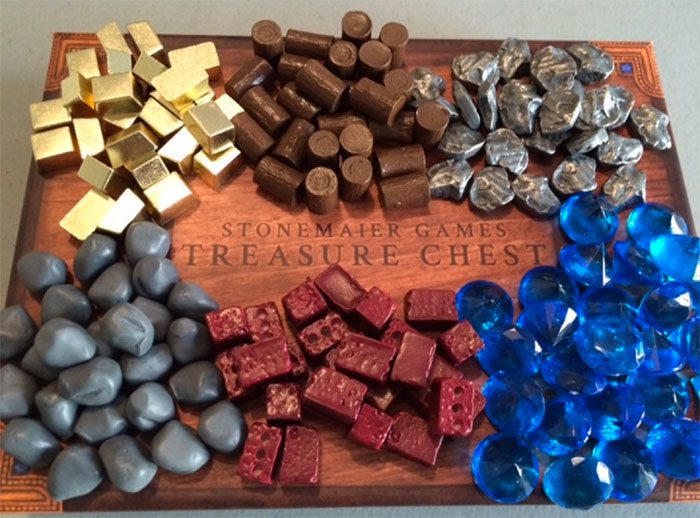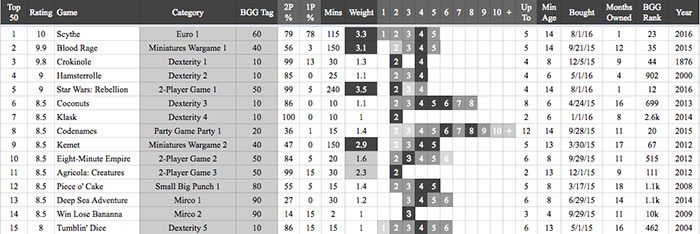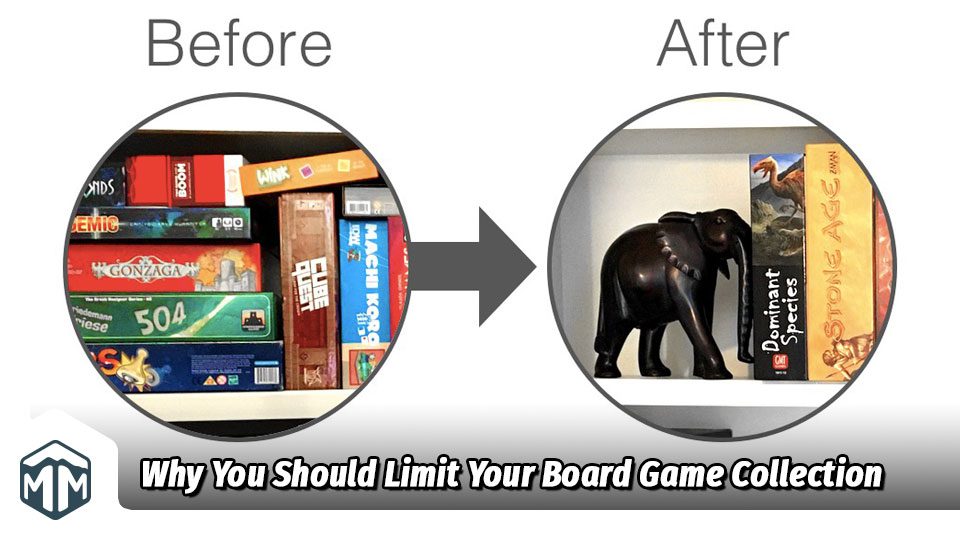In the last few years I transitioned from showing up to play board games, to owning board games. It’s been incredibly rewarding. The only problem was when I went a bit crazy and I grew my collection too quickly.
As a result of not fully vetting new purchases, I created a few issues. I had too many games sitting unplayed, a stack of games that now needed new homes, and no budget left to buy the games that actually would be the best fit.
The solution? I found the best way to combat out-of-control collection growth was to set a hard limit on how many games I should keep. If your collection is growing faster than you can manage it, setting a limit could put you back in control.
You’re Not the Boss of Me!
“You want to put a restriction on me?!” is a typical reaction to limits. But limits often have huge, hidden benefits. Here’s an example.
If it weren’t for the restriction of having center lines on a road, getting somewhere would be more dangerous and take a lot longer.
A well placed restriction creates freedom.
Here are the top 6 reasons to limit your collection:
- Love playing every game someone pulls off your shelf.
- Spend less money on games that aren’t a great fit.
- Have the money to upgrade the games you love.
- Always have enough shelf space to display and store your games well.
- Have a system that forces you to continually cull your collection.
- Gain better insight on how to make future purchasing decisions.
Granted, if you feel like all the games in your collection are a good fit, setting a limit won’t do much. But if your collection needs some culling, keeping a limit for your current situation can be a great habit. It will push you to swap out the games you just find ok for ones you love.
Here’s are the top 6 advantages I’ve found for limiting your board game collection.
1. Love playing every game someone pulls off your shelf.
Having a hard limit means tough choices, but in the end you’re left with the cream of the crop.
In my collection, I try to have around 5 games that can accommodate large player counts. Cash and Guns plays best at 6-8 players and it was in my collection for a while. Though, the longer I played it, the more I realized the most innocent-looking player in any given game tended to win.
I lost my desire to play this one during game nights, so when I was introduced to new games with larger player counts, like Codenames, it was an easy decision to swap them out.
My limit is constantly helping me evolve my collection. Now I’m happy to play any game someone pulls off my shelf.
2. Spend less money on games that aren’t a great fit.

With over 3,000 new games being published each year, it’s helpful to take your time and only buy the ones that makes most sense for your collection.
If you have a limit, buying a new game is a much more elaborate process. You don’t buy games you want: you buy games that are a good fit for your collection.
If your limit is maxed out, that means buying a new game will replace one of your other games. Will you get more joy from the new game? Will you be able to get the new game to the table more often? Is this type of game what’s really needed in your collection?
Buying something becomes a more weighed decision. You’ll buy less and make less mistakes on impulse buys that don’t end up being a good fit. Buying less of the wrong thing also means you’re not wasting time and money selling 3 used games to buy 1 or 2 new ones.
3. Have the money to upgrade the games you love.

Being slower to buy saves you money. That savings allows you to buy new games when they really are a good fit. This savings also allows you to pimp out the games you know you’re keeping for a while.
Expansions and accessories can elevate a gaming experience. Sometimes investing in the games you own can bring more joy than buying a new game.
If there are parts of your collection that are just sitting in shrink wrap or not getting the love it deserves, why not consolidate and invest in the games you play most often?
4. Always have enough shelf space to display and store your games well.
We’ve all been to that friend’s house who has an overrun board game closet. In cases like these, it can be hard to know all your gaming options if games are hidden behind stacks of other games.
Poor storing can decrease your options, damage your boxes, and increase setup time. You don’t want to spend your time hunting down the right game (or the games with the right player count), when you have a group ready to play.
Set a board game limit that takes into account the amount of space you have for board games. Then you can keep everything organized and ready to go.
5. Have a system that forces you to continually cull your collection.
Having the wrong games in your collection can happen gradually. Maybe you often played 2-player games with your roommate, but now you’re in a place where you often play 4-player games when company is over.
Having a cap on your board game collection means you don’t have to think about how often to cull your collection. It’s a natural, ongoing process. When you come up against your limit and buy a new game, you can decide which game is no longer a great fit.
6. Gain better insight on how to make future purchasing decisions.

Above is a photo of my epic board game spreadsheet I keep for my collection. Since I have fewer games than I would have without a system, managing my collection is a bit easier to handle.
When I make decisions about which games are and aren’t a good fit, patterns begin to form and I categorize groups of games based on what purpose they serve. I have a group of games that travel well. I have a group of games that are great for 2 players. I have a group of games I take to parties.
Because of this greater awareness, I can make smarter decisions when buying and culling. If one game is just as fun as another, but more versatile, it’s more likely to get into my collection.
How Do I Set My Limit?
Everyone’s limit will be different, and justifiably so. If you get to game multiple times a week, a large collection could get the proper love it deserves. If you only game once a month, having a large collection doesn’t make sense.
I’ve set my personal limit at 75 for two reasons. 50 was too oppressive and 100 didn’t force any tough decisions on me. When setting your number, you want to hit the same mark.
You want your collection limit to be low enough that it forces you to cull games that aren’t a good fit, and high enough that you have the space to add new games you’re excited about.
Here are some questions to consider when setting your number:
- How often do you get to play board games?
- How often do you get to play the board games you own?
- What’s the overlap between games you own and the games your friends own?
- What percentage of your current collection doesn’t get played at least twice a year?
- What’s your budget for buying new games each year?
- How many games can you comfortably display and store well?
- Are you primarily buying games to play them or to collect them?
The idea of limiting something that brings so much joy can be counterintuitive. Though if you’re like me—and you sometimes grow your collection too quickly—I challenge you to try it out. A limit on your collection will give you freedom.
A board game collection shouldn’t be static. It should evolve along with your tastes and your changing circumstances. Spend the time optimizing your collection and it’ll produce even more joy than it already does now.
Ready to set your limit?








